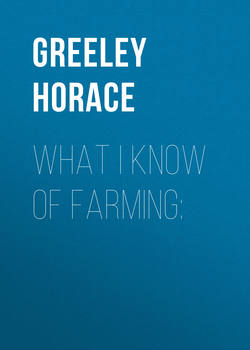What I know of farming:

Реклама. ООО «ЛитРес», ИНН: 7719571260.
Оглавление
Greeley Horace. What I know of farming:
PREFACE
I. WILL FARMING PAY?
II. GOOD AND BAD HUSBANDRY
III. WHERE TO FARM
IV. PREPARING TO FARM
V. BUYING A FARM
VI. LAYING OFF A FARM – PASTURING
VII. TREES – WOODLAND – FORESTS
VIII. GROWING TIMBER – TREE-PLANTING
IX. PLANTING AND GROWING TREES
X. DRAINING – MY OWN
XI. DRAINING GENERALLY
XII. IRRIGATION – MEANS AND ENDS
XIII. THE POSSIBILITIES OF IRRIGATION
XIV. PLOWING – DEEP OR SHALLOW
XV. PLOWING – GOOD AND BAD
XVI. THOROUGH TILLAGE
XVII. COMMERCIAL FERTILIZERS – GYPSUM
XVIII. ALKALIS … SALT – ASHES – LIME
XIX. SOILS AND FERTILIZERS
XX. BONES – PHOSPHATES – GUANO
XXI. MUCK – HOW TO UTILIZE IT
XXII. INSECTS – BIRDS
XXIII. ABOUT TREE-PLANTING
XXIV. FRUIT-TREES – THE APPLE
XXV. MORE ABOUT APPLE-TREES
XXVI. HAY AND HAY-MAKING
XXVII. PEACHES – PEARS – CHERRIES – GRAPES
XXVIII. GRAIN-GROWING – EAST AND WEST
XXIX. ESCULENT ROOTS – POTATOES
XXX. ROOTS – TURNIPS – BEETS – CARROTS
XXXI. THE FARMER'S CALLING
XXXII. A LESSON OF TO-DAY
XXXIII. INTELLECT IN AGRICULTURE
XXXIV. SHEEP AND WOOL-GROWING
XXXV. ACCOUNTS IN FARMING
XXXVI. STONE ON A FARM
XXXVII. FENCES AND FENCING
XXXVIII. AGRICULTURAL EXHIBITIONS
XXXIX. SCIENCE IN AGRICULTURE
XL. FARM IMPLEMENTS
XLI. STEAM IN AGRICULTURE
XLII. CO-OPERATION IN FARMING
XLIII. FARMERS' CLUBS
XLIV. WESTERN IRRIGATION
XLV. SEWAGE
XLVI. MORE OF IRRIGATION
XLVII. UNDEVELOPED SOURCES OF POWER
XLVIII. RURAL DEPOPULATION
XLIX. LARGE AND SMALL FARMS
L. EXCHANGE AND DISTRIBUTION
LI. WINTER WORK
LII. SUMMING UP
Отрывок из книги
Men have written wisely and usefully, in illustration and aid of Agriculture, from the platform of pure science. Acquainted with the laws of vegetable growth and life, they so expounded and elucidated those laws that farmers apprehended and profitably obeyed them. Others have written, to equally good purpose, who knew little of science, but were adepts in practical agriculture, according to the maxims and usages of those who have successfully followed and dignified the farmer's calling. I rank with neither of these honored classes. My practical knowledge of agriculture is meager, and mainly acquired in a childhood long bygone; while, of science, I have but a smattering, if even that. They are right, therefore, who urge that my qualifications for writing on agriculture are slender indeed.
I only lay claim to an invincible willingness to be made wiser to-day than I was yesterday, and a lively faith in the possibility – nay, the feasibility, the urgent necessity, the imminence – of very great improvements in our ordinary dealings with the soil. I know that a majority of those who would live by its tillage feed it too sparingly and stir it too slightly and grudgingly. I know that we do too little for it, and expect it, thereupon, to do too much for us. I know that, in other pursuits, it is only work thoroughly well done that is liberally compensated; and I see no reason why farming should prove an exception to this stern but salutary law. I may be, indeed, deficient in knowledge of what constitutes good farming, but not in faith that the very best farming is that which is morally sure of the largest and most certain reward.
.....
I look back, on this day completing my sixtieth year, over a life, which must now be near its close, of constant effort to achieve ends whereof many seem in the long retrospect to have been transitory and unimportant, however they may have loomed upon my vision when in their immediate presence. One achievement only of our age and country – the banishment of human chattelhood from our soil – seems now to have been worth all the requisite efforts, the agony and bloody sweat, through which it was accomplished. But another reform, not so palpably demanded by justice and humanity, yet equally conducive to the well-being of our race, presses hard on its heels, and insists that we shall accord it instant and earnest consideration. It is the elevation of Labor from the plane of drudgery and servility to one of self-respect, self-guidance, and genuine independence, so as to render the human worker no mere cog in a vast, revolving wheel, whose motion he can neither modify nor arrest, but a partner in the enterprise which his toil is freely contributed to promote, a sharer in the outlay, the risk, the loss and gain, which it involves. This end can be attained through the training of the generation who are to succeed us to observe and reflect, to live for other and higher ends than those of present sensual gratification, and to feel that no achievement is beyond the reach of their wisely combined and ably self-directed efforts. To that part of the generation of farmers just coming upon the stage of responsible action, who have intelligently resolved that the future of American agriculture shall evince decided and continuous improvement on its past, this little book is respectfully commended.
New York, Feb. 3, 1871.
.....